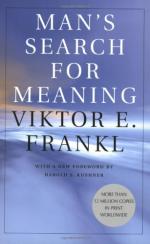
|
| Name: _________________________ | Period: ___________________ |
This quiz consists of 5 multiple choice and 5 short answer questions through "Logotherapy in a Nutshell" (through page 157).
Multiple Choice Questions
1. In contrast to psychoanalysis, what does Frankl claim logotherapy is centered around?
(a) Principle.
(b) The will to meaning.
(c) The right to dignity.
(d) Decision.
2. Why does Dr. Frankl describe that he sits next to corpses "crawling with lice" but they did not bother him?
(a) He was happy, sitting near these corpses, thinking about the lives that he was able to save as a doctor.
(b) He was thankful, as he looked at these corpses, that he had not yet died.
(c) He mentions this to illustrate the ideas that he was so emotionally detached that he simply didn't care who was near him.
(d) This was a space where he could find short periods of solitude.
3. For Frankl, what makes life meaningful and purposeful?
(a) Love.
(b) Hope for the future.
(c) Spiritual freedom.
(d) Humanity.
4. How does Frankl respond to those who claimed they would commit suicide because "they had nothing to expect from life any more"?
(a) "Man was made to suffer, but there is meaning in suffering. With great humility this is possible."
(b) "It did not really matter what we expected from life, but rather what life expected from us."
(c) "Happiness can still be achieved."
(d) "You must truly listen to your own inner voice, and you will find that there is much more that you can expect."
5. What question does Frankl claim that more and more doctors are confronted with?
(a) What is life?
(b) Where can I find love?
(c) Why do we all die?
(d) How can I act responsibly?
Short Answer Questions
1. What does the author have to do to satisfy the SS while filling in for the senior block warden?
2. What role does suffering play in life, according to Frankl?
3. What does Frankl write about responsibility?
4. What did Frankl think when he saw a group of convicts pass by?
5. What was the main characteristic of the second phase of the prisoner's mental life?
|
This section contains 481 words (approx. 2 pages at 300 words per page) |

|




